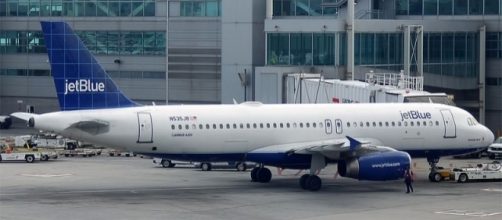JetBlue announced Wednesday they will be testing out Facial Recognition Technology on a three-month pilot basis, for passengers heading to Aruba from the Logan Airport in Boston next month.
New York-based JetBlue has said it will be collaborating with both U.S. Customs and Border Protection, as well as SITA, a Swiss information technology company, to test the new self-boarding process.
A ‘selfie’ instead of a boarding pass
Instead of the normal paper boarding passes, passengers will be photographed at the airport gates. The facial recognition system will then compare the photo to their passport or visa photos already on file with Customs and Border Protection.
Only those with successful photo matches will be allowed to board without showing a boarding pass, ticket or passport. However, passengers will reportedly still need to have their passports with them.
Put your boarding pass away. JetBlue is testing facial recognition technology for self-boarding. https://t.co/bDfWWuT1HY pic.twitter.com/YYCAQAscy9
— CNN (@CNN) June 1, 2017
Jetblue spokeswoman, Joanna Geraghty, told the Boston Globe that the new system could see a new era of high-tech ticketing, doing away with the old system of travel documents and making things smoother from check-in and baggage drop, right through to customs and boarding. She stressed that the main advantage of the new system would be customer ease.
While the trial is running, JetBlue will set up a separate line at the gate for those passengers who are willing to use the facial recognition system, which reportedly only takes a few seconds. The three-month trial starts on June 12 and Geraghty said it will test the speed and accuracy of facial recognition. It will also test how willing passengers are to use a system which some say raises privacy concerns. If the three-month trial runs smoothly, JetBlue may expand the technology to other destinations.
Delta Air Lines also testing facial recognition technology
JetBlue isn’t alone in testing out facial recognition technology at airports. Testing of the technology will also be run at other airports.
Reportedly Delta Air Lines also plans to install a similar system at Minneapolis-St. Paul International Airport, which would allow passengers to check their own bags. Once their identity is verified against their passport photos, passengers could then check in their bags without the need for human intervention. Delta spokeswoman Ashton Morrow said the new system is about taking the stress out of travel and making things easier for passengers.
Starting this month, @Jetblue will offer passengers flying from Boston to Aruba the option to scan your face as a boarding pass. pic.twitter.com/wH3uMl1mh1
— Only In Boston (@OnlyInBOS) June 1, 2017
Facial recognition technology makes things easier but raises privacy concerns
As noted by the New York Post, while the new facial recognition technology sounds like it will make things more convenient for travelers, some privacy advocates are speaking out against the plans.
According to Jeramie Scott, a lawyer working with the Electronic Privacy Information Center, using facial recognition technology gives the federal government more surveillance capabilities. Scott said the country needs regulations that provide oversight, accountability, and transparency over the use of such technology.


